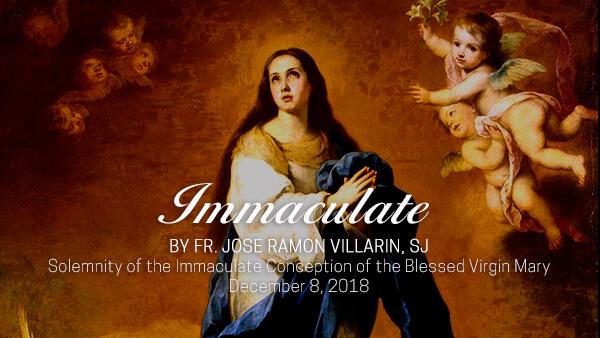Our faith is beautiful. Its beauty is found not just in its rationality or reasonableness but also in its humanity.
Take our devotion to Mary our Mother. While our Catholic devotion to Mary can be a challenge to both believers and non-believers, our Marian devotion tells us something about our humanity and the nature of our Catholic faith.
At the very least, the grace of Mary is twofold: the gift of feeling (i.e. the affect or heart) in the life of faith and the gift of intercession in this life of need.
Because of Mary, we know that faith is more than just cognitive or intellectual assent. When we profess our faith, we are more than just subscribing to doctrinal truths revealed to us in Scripture. Our devotion to Mary, who was wont to ponder things in her heart, leads us to recover the important place of the heart in the landscape of faith. Mary leads us to the portals of imagination and contemplation, which portals open us to God. Such interior relishing of the mysteries of our human journey is not just an act of the mind. Faith engages our heart and soul and strength.
You cannot be fundamentalist or literalist in your reading of Scripture if you are devoted to Mary. You will not find justification for these catholic acts of Marian devotion (such as the salubong or the rosary for example) solely in Scripture. You will not find contradiction either. Any justification for our turning to Mary will be found instead in an intuition, happily feminine perhaps, of what we believe to be true and deeply human.
Such is the nature of faith that it is, in some sense, a human extrapolation from the evidence. Faith is a gift that allows us to connect the disparate dots and move us beyond the dots we see. It is both a reasonable (or rational) and affective extrapolation, a leap from the known into the unknown that cannot be explained by reason alone. Faith is a resolute wading into the wilderness, armed not just with rational calculation but with the affective or imaginative or intuitive sensing that we humans are known to cultivate as well.
The other gift of our Marian devotion is the gift of intercession. It is a human thing to be indirect, to be at times disabled from confronting realities that are far larger than we can ever imagine. Mediation is a human reality. To seek intercession or to intercede for someone is to be human.
Thus when we turn to Mary to intercede for us, it is not so much because God is distant as because we feel ourselves distant from God. It is this sense of “hiya” that prods us to turn to our mothers who we intuit will understand us because we all were knitted together once upon a time in the flesh of their wombs.
It was with maternal eyes that Mary came to sense that they had no more wine in the wedding at Cana (which trans-literally, reading between and beyond the lines, we take to mean: they had no more joy or hope or life in them). It was maternal courage that brought Mary to Calvary. The Pieta of Michelangelo is not recorded in Scripture but this sorrowful portrait of mother and son reveals the depth and strength of human, maternal love.
The Immaculate Concepcion is a mystery borne out of a human intuition, an affective extrapolation of faith, a sense that it is only proper to prepare the human vessel that was to hold the Redeemer in the flesh of her womb. After all, his flesh and face and blood are dearly hers as well.
We will never be as immaculate but it is only fitting that we never lose heart in preparing ourselves as well. As earthen vessels that are wont to run out of wine every so often, we are called to carry the life of Christ in our lives, no matter the fissures and flaws.
Such a sacred and overwhelming mandate indeed. But not hopeless because of Mary, and surely not impossible with an imaginative and gracious God.
